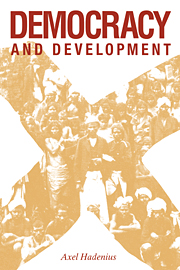Book contents
- Frontmatter
- Contents
- List of tables and figure
- Acknowledgements
- INTRODUCTION
- PART ONE DETERMINING THE LEVEL OF DEMOCRACY
- PART TWO EXPLAINING THE LEVEL OF DEMOCRACY
- 4 Introduction
- 5 Socio-economic conditions
- 6 Demographic and cultural conditions
- 7 Institutional conditions
- 8 General picture and problems of causality
- Appendices
- Notes
- Bibliography
- Index
7 - Institutional conditions
Published online by Cambridge University Press: 28 October 2009
- Frontmatter
- Contents
- List of tables and figure
- Acknowledgements
- INTRODUCTION
- PART ONE DETERMINING THE LEVEL OF DEMOCRACY
- PART TWO EXPLAINING THE LEVEL OF DEMOCRACY
- 4 Introduction
- 5 Socio-economic conditions
- 6 Demographic and cultural conditions
- 7 Institutional conditions
- 8 General picture and problems of causality
- Appendices
- Notes
- Bibliography
- Index
Summary
COLONIAL BACKGROUND
Virtually all the countries of the Third World were once colonies and thereby subject to a foreign power, usually European. This led to the creation of political and administrative structures which the new states took over in one way or another after the advent of independence. Side by side with the different institutional legacies handed down by the imperial nations, it has been alleged, their political conduct, not least during the actual decolonization process, left its mark (through the force of example) in the countries concerned.
Before examining the arguments which are wont to be adduced concerning the significance of the colonial background, I should begin by acknowledging a limitation regarding the empirical study which follows. As is well known, the colonial period did not run parallel in different parts of the world. In Latin America it began in the sixteenth century and was concluded in the late 1800s. Consequently, it came to an end before the great expansion in Africa and also in large parts of the Middle East, Asia and Oceania, which occurred in the second half of the nineteenth century. The decolonization of the countries in the latter areas (and also in the Caribbean) did not take place until after the Second World War, particularly in the late 1950s and early 1960s. If the colonial link is to be adjudged relevant to the conditions of today, it really should not be too far back in time.
- Type
- Chapter
- Information
- Democracy and Development , pp. 128 - 142Publisher: Cambridge University PressPrint publication year: 1992



